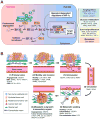Hypoxia and hypoxia-inducible factors: master regulators of metastasis
- PMID: 20962028
- PMCID: PMC3005023
- DOI: 10.1158/1078-0432.CCR-10-1360
Hypoxia and hypoxia-inducible factors: master regulators of metastasis
Abstract
Hypoxia is a common condition found in a wide range of solid tumors and is often associated with poor prognosis. Hypoxia increases tumor glycolysis, angiogenesis, and other survival responses, as well as invasion and metastasis by activating relevant gene expressions through hypoxia-inducible factors (HIF). HIF-1α and HIF-2α undergo oxygen-dependent regulation, and their overexpression is frequently associated with metastasis and poor clinical outcomes. Recent studies show that each step of the metastasis process, from the initial epithelial-mesenchymal transition to the ultimate organotropic colonization, can potentially be regulated by hypoxia, suggesting a master regulator role of hypoxia and HIFs in metastasis. Furthermore, modulation of cancer stem cell self-renewal by HIFs may also contribute to the hypoxia-regulated metastasis program. The hypoxia-induced metastatic phenotype may be one of the reasons for the modest efficacy of antiangiogenic therapies and may well explain the recent provocative findings that antiangiogenic therapy increased metastasis in preclinical models. Multiple approaches to targeting hypoxia and HIFs, including HIF inhibitors, hypoxia-activated bioreductive prodrugs, and gene therapies may become effective treatments to prevent or reduce metastasis.
©2010 AACR.
Conflict of interest statement
No potential conflicts of interest were disclosed.
Figures

References
-
- Harris AL. Hypoxia [mdash] a key regulatory factor in tumour growth. Nat Rev Cancer. 2002;2:38–7. - PubMed
-
- Semenza GL. Targeting HIF-1 for cancer therapy. Nature Rev Cancer. 2003;3:721–2. - PubMed
-
- Winter SC, Buffa FM, Silva P, et al. Relation of a hypoxia metagene derived from head and neck cancer to prognosis of multiple cancers. Cancer Res. 2007;67:3441–9. - PubMed
Publication types
MeSH terms
Substances
Grants and funding
LinkOut - more resources
Full Text Sources
Other Literature Sources

